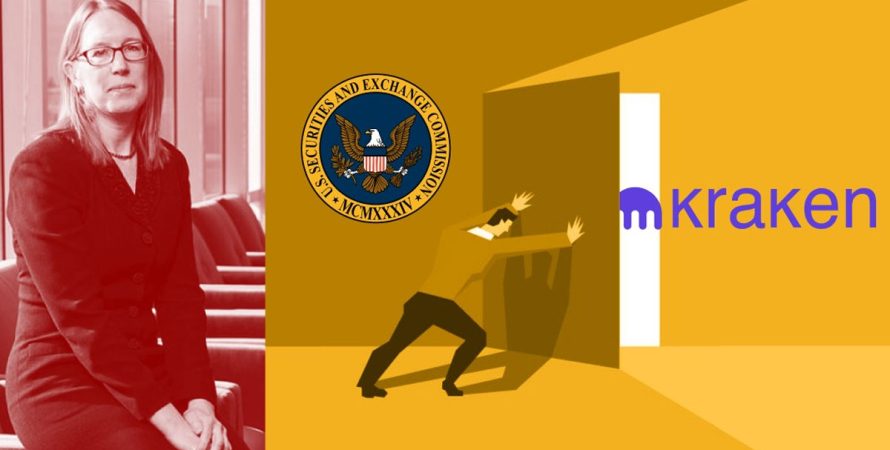Kraken’s settlement with the SEC over its staking-as-a-service product has put other exchanges on notice—but it may be a boon for decentralized alternatives.
There’s a lot at stake in how Kraken’s settlement with the Securities and Exchange Commission plays out for the crypto industry.
On Thursday afternoon, the SEC announced that crypto exchange Kraken agreed to pay a $30 million fine for not registering the offering and sale of its crypto asset staking-as-a-service program. Just a day before, Coinbase CEO Brian Armstrong warned on Twitter that he’d heard “the SEC would like to get rid of crypto staking in the U.S. for retail customers.”
Stay in the know on crypto by frequently visiting Crypto News Today
On its face, it sounds like something that should have been bad for all crypto staking services. But that’s not quite how the news landed. The governance tokens for Lido and Rocket Pool, two of the largest pooled staking services, soared as high as 11% in the past day, according to CoinGecko.
It’s a sign that the market thinks centralized exchanges as staking intermediaries, like Kraken and Coinbase, should worry, but not the rest of the industry. In the past day, Coinbase Wrapped Staked ETH (cbETH) selling volume has outpaced buying at a ratio of almost 3:1, according to GeckoTerminal.
Staked assets on proof-of-stake networks, like Ethereum, help keep networks running. They’re how validators, whose hardware stores data and processes new transactions, prove they have skin in the game. Validators receive rewards for participating on networks, but can lose some of their staked assets for inactivity or other offenses.
Becoming a standalone Ethereum validator, which is now the largest proof of stake network, isn’t easy for most retail-level investors. A user would need 32 ETH, worth roughly $48,000 at current prices, to do it. Instead, users with more modest amounts of ETH to stake turn to staking-as-a-service and pooled staking providers.
Those come in two different flavors: straightforward and liquid staking. The latter is meant to give users the best of both worlds: They get a share of validator rewards for their deposited ETH and a token, redeemable for their staked assets, that can be traded or used as collateral.
As a category, the 65 liquid-staking protocols tracked by DeFi Llama account for $12 billion, or 26%, of the $47 billion worth of assets in the DeFi ecosystem. That means they’re the third-largest category behind $13 billion in lending, and $19 billion on decentralized exchanges, or DEXes.

More than $11 billion worth of the assets in liquid-staking protocols is Ethereum. And among the 16 protocols that support ETH staking, Lido is far and away the largest. It accounts for $8 billion, or 75%, of the funds that have been deposited.
It seems at least part of the problem the SEC had with Kraken’s program was an oversimplification of staking to make it less intimidating for retail customers. A section of the SEC’s complaint takes issue with the fact that Kraken itself determined the returns that its customers would receive, as opposed to the variable rate of rewards determined by the protocol.
“Defendants determine these returns, not the underlying blockchain protocols, and the returns are not necessarily dependent on the actual returns that Kraken receives from staking,” the commission wrote.
By doing so, Kraken made itself too much of an intermediary, Alex Mogul, senior director of staking and infrastructure at Republic Crypto, told Decrypt.
“When you’re depositing to Kraken and then Kraken handles the math, that’s far and away easier than trying to switch the network that you’re engaging with, then press transact to delegate stake. It is really complicated,” she said.
For its part, Coinbase has said its staking program is not like Kraken’s.
“Staking on Coinbase continues to be available and staked assets continue to earn protocol rewards. What’s clear from today’s announcement is that Kraken was essentially offering a yield product,” Paul Grewal, Coinbase’s chief legal officer, said in a statement yesterday. “Coinbase’s staking services are fundamentally different and are not securities. For example, our customers’ rewards depend on the rewards paid by the protocol, and commissions we disclose.”
Mogul, who leads the Runtime staking-as-a-service offering at Republic Crypto, said she hopes to see software, like better designed wallets, fill the gap that might now be left by centralized exchanges in staking options.
“I still think we can build software products that abstract that complexity without sacrificing who’s in custody of the assets,” she said.
On the other end of the investor spectrum, Jaydeep Korde, Launchnodes co-Founder and CEO, said the Kraken settlement will push business towards decentralized alternatives.
His company offers non-custodial staking solutions for institutions or high-net-worth individuals who have the 32 ETH required to run their own node, but don’t want to handle the tech on their own. The user owns the infrastructure used to operate a validator, but Launchnodes handles all the upkeep.
“By running your staking operations on infrastructure you own, it avoids needing to trust compliant, regulated or non-regulated crypto businesses that are seemingly ever bigger governance and operational holes,” he told Decrypt in an email.![]()
Read More at DECRYPT
Please Read Essential Disclaimer Information Here.
© 2024 Crypto Caster provides information. CryptoCaster.world does not provide investment advice. Do your research before taking a market position on the purchase of cryptocurrency and other asset classes. Past performance of any asset is not indicative of future results. All rights reserved.
Contribute to CryptoCaster℠ Via Metamask or favorite wallet. Send Coin/Token to Addresses Provided Below.
Thank you!
BTC – bc1qgdnd752esyl4jv6nhz3ypuzwa6wav9wuzaeg9g
ETH – 0x7D8D76E60bFF59c5295Aa1b39D651f6735D6413D
MATIC – 0x7D8D76E60bFF59c5295Aa1b39D651f6735D6413D
LITECOIN – ltc1qxsgp5fykl0007hnwgl93zr9vngwd2jxwlddvqt





